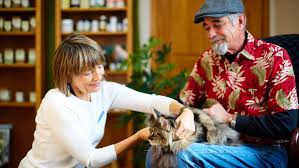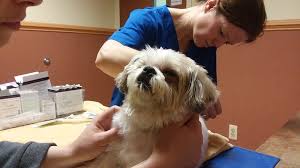What is a holistic vet? What is an integrative vet? What is a traditional, conventional vet?
Holistic veterinarians practice medicine differently from integrative and conventional veterinarians. While many principles are shared between conventional vets, holistic vets and integrative vets, methodologies are often quite different.
Holistic veterinary medicine recognizes that a balanced immune system is a vital, healing force in an animal’s body, and when immunity is supported, disease may be prevented or delayed. Holistic veterinarians conduct a comprehensive physical examination, including an animal’s behavior, recent and past medical history, diet and dietary history, environment, emotional stress and other factors. Holistic veterinary medicine also incorporates botanical medicine, nutraceuticals, acupuncture, chiropractic, homeopathy, hydrotherapy, massage therapy and other alternative wellness therapies.
Holistic veterinarians also approach medicine as treating the animal body as a biological whole, addressing all bodily systems and consider how the body systems are interconnected. While two different pets may present similar symptoms, their respective treatments may be markedly different. A holistic veterinarian’s practice is centered on preventative medicine as well as health maintenance.
Holistic veterinary care is focused on finding and treating the root cause of disease instead of treating the symptom. For example, an animal may develop chronic colitis after being vaccinated. Instead of dispensing antibiotics or steroids to mask the symptom of bloody diarrhea, holistic veterinarians may utilize herbs and supplemental remedies, whole food diets, acupuncture, homeopathy, vitamins and mineral supplementation to restore metabolic and digestive balance.
Integrative medicine combines both conventional and holistic veterinary practices. An integrative veterinarian studies conventional veterinary medicine but also recognizes the value of holistic medicine and realizes that both compliment and support animal wellness. An integrative veterinarian is interested in both conventional and alternative treatments; and will most likely be a member of the American Holistic Veterinary Medical Association.
Traditional, conventional veterinary practice operates similarly as Western medicine is used for humans. The focus is aimed at determining what the problem is and then trying to solve it based on addressing symptoms. While a traditional veterinarian is a professional with your pet’s best interest at heart, he or she is typically confined to using synthetic steroids and antibiotic medicine, which do not always solve a chronic or undetermined condition. Many times a conventional veterinarian will prescribe medication that may silence symptoms but not resolve the underlying problem.
Conventional veterinary medicine has become increasingly advanced and a wide array of techniques and options are now available to the average pet owner. Ultrasound, x-ray, MRI, chemotherapy, blood transfusion, and physical therapy are commonly used.

Perspective of a Holistic Veterinarian
Treat the whole animal, not merely the current problem.
If there is a current problem, for example diarrhea or itching, a good holistic veterinarian will ask questions about what problems there have been in the past, what has changed in the household or the environment that may have triggered the current complaint and if there is anything that makes the current complaints better or worse.
They will always evaluate the overall energy level of the animal. Their goal is to make the animal healthier for life, not just to get rid of the current symptom.
They will educate you and explain what they see when physically examining your animal.
A good holistic veterinarian will be thrilled at what you are learning at the Holistic Actions Academy – HMDM setting of a goal of deep healing and not merely symptom relief; basic health care of feeding fresh diet, few toxins, etc; 6 P’s, especially the one on Patience; that you are keeping a journal; that you want to be a partner with them rather than merely asking for treatments.

Finding a Holistic Veterinarian
STEP 1: Go to the web sites for each holistic veterinary organization and read about that modality. Go to their referral list to find one near to you.
STEP 2: visit the web site of any practitioners you are interested in.
STEP 3: do an internet search to find more possibilities – “holistic veterinarian Baltimore” or “herbal veterinarian Baltimore”.
STEP 4: Call any local holistic practitioners for people, local health food stores and even pet stores to inquire who they know.
STEP 5: if no one near seems like a good match, look for a homeopathic veterinarian who does phone consults.
STEP 6: personally evaluate the veterinarian

Practitioner health
This is simple: Find a practitioner who maintains her own health – if for no other reason, so she’ll still be around to help you a few years from now! Practicing holistic medicine can be extremely demanding and stressful, and for a practitioner to maintain sustainability she/he will need to recharge on a continuing basis. Rechargers for the professional include: continuing education, alternative medicine meetings, learning new methods and techniques, personal chi exercises (tai chi, chi gong, yoga, aikido, and other martial arts), and living a healthy, holistic lifestyle.
A question you should ask of all your holistic practitioners is: “Doc, what are you doing for yourself?”
In addition to a periodic recharge, all holistic practitioners need to walk their talk, so to speak. Your practitioner should be involved in healthy relationships, must not smoke or have other detrimental lifestyle habits, should be in relatively good physical condition, and should practice what she preaches regarding good nutrition and supplements. In addition, the person who works on your animals should know (and use) several alternative medicine practitioners who work on humans.
Finally, a practitioner who expects to stay around for more than a few years will have developed a fee structure that allows her to live a healthy lifestyle. Again, I could write reams about the importance of charging fees that are adequate to sustain the practitioner, but let this suffice:
Professionals charge fees for services rendered and goods delivered. Since holistic veterinarians actually frown on vaccines, steroids, and antibiotics, they typically generate very little (if any) income from these sources. And, although there are exceptions to this rule, most holistic practitioners don’t have much of an inventory to sell – their true inventory is their cache of information they have stored in their heads, and their overhead lies in the cost of their specialized schooling. Holistic medicine will almost certainly appear at first glance to be more expensive than the typical visit to a western medicine practitioner. However, I like to think (although I’m not absolutely certain) that the overall fees will be less, over the lifetime of the animal. This, I am sure of: Pets that are living a holistic lifestyle will be healthier over their lifetime.
Practitioner passion
To my way of thinking, passion is born from an inner germination of the seeds of love, intention, satisfaction, and creative force. The entry-level guiding light for all practitioners who work on animals is their passionate love for the animals, their intention to make them well and keep them healthy.
People who are led by their passions have an energetic glow – an inner light, often expressed as an expanded and healthy outer aura. While none of these outer and inner signs of passion can be measured by scientific means, they can be easily felt and sensed by anyone open to them. Use your sense of awareness (best accessed with an open heart) to feel how much energy your alternative practitioner has. And remember you are evaluating inner energetics – not personal charisma, bedside manner, nor the practitioner’s apparent love for your dog.